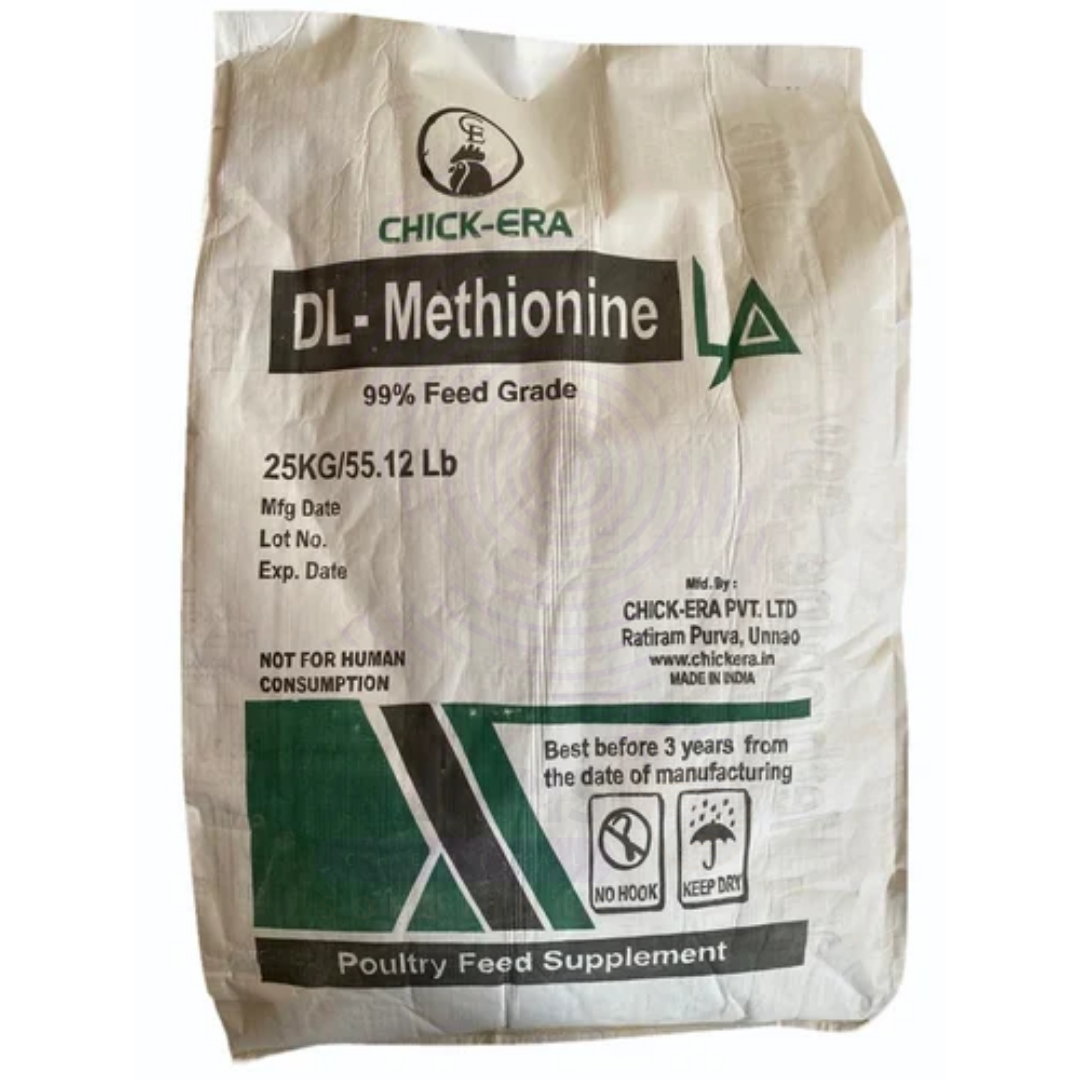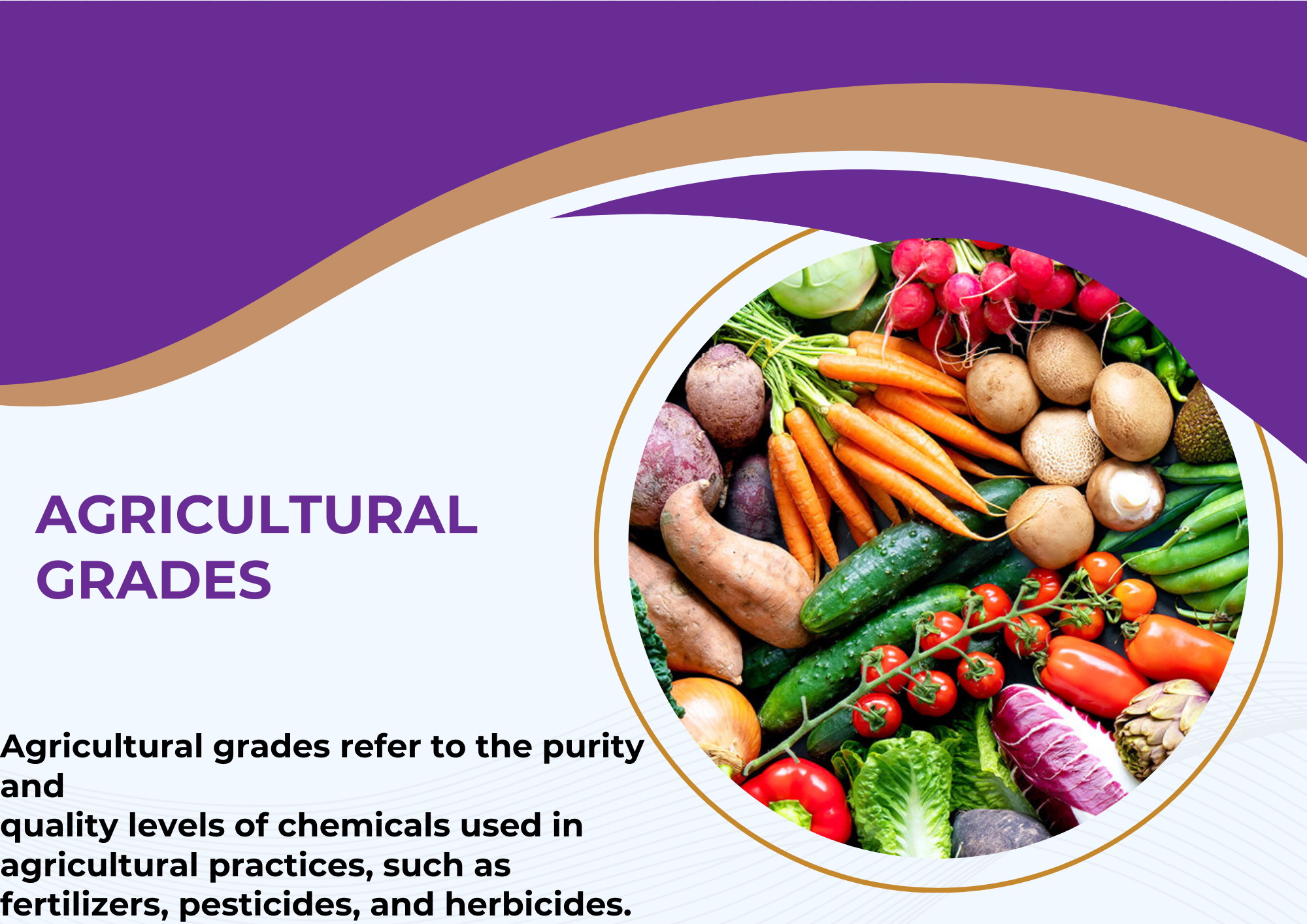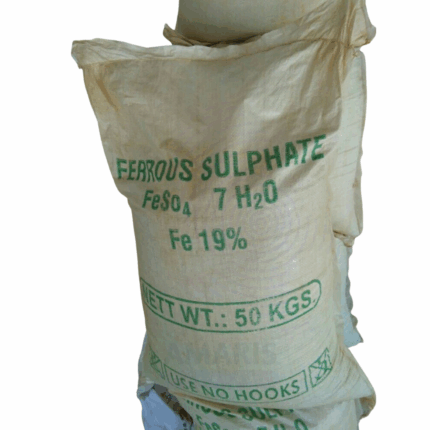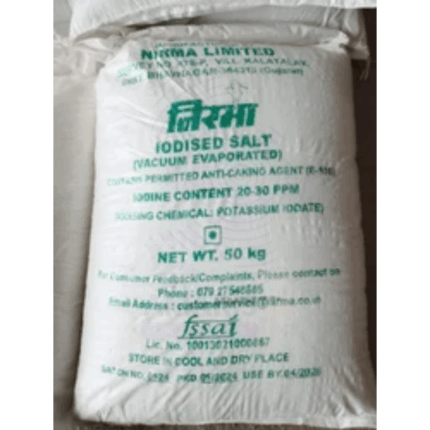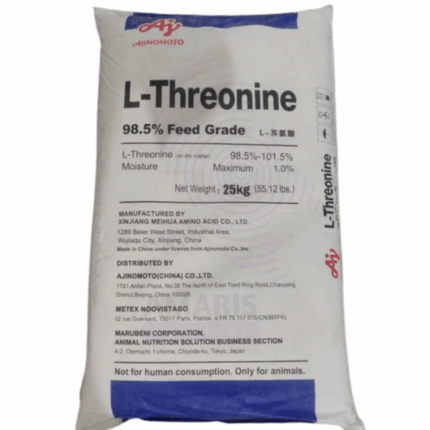“Disodium Phosphate” has been added to your cart. View cart
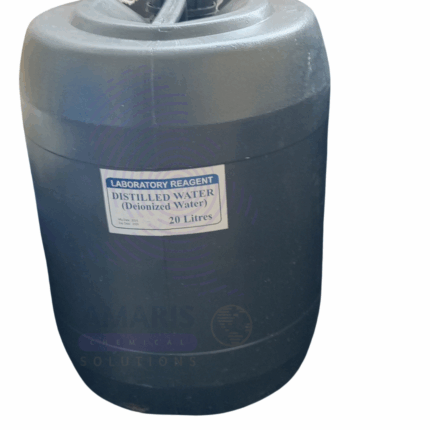
Distilled Water
$ 1.00 Original price was: $ 1.00.$ 0.33Current price is: $ 0.33.
DL-Methionine Feed Grade
Whatsapp Order
DL-Methionine Feed Grade is a synthetic, racemic mixture of the amino acid methionine, consisting of equal parts D- and L-isomers. It is an essential sulfur-containing amino acid widely used as a nutritional supplement in animal feed formulations. DL-Methionine plays a critical role in protein synthesis, growth, and metabolic functions in livestock and poultry. This feed-grade quality ensures high purity (minimum 99%) and suitability for inclusion in feed blends to enhance growth performance, improve feed efficiency, and prevent methionine deficiency-related disorders.
Description
Table of Contents
Toggle
DL-Methionine Feed Grade
Primary Uses
Animal Nutrition
- Used extensively as a feed additive for poultry, swine, ruminants, aquaculture, and pet food to supply essential sulfur amino acids.
- Enhances growth rates, feed conversion ratios (FCR), and overall animal health by preventing methionine deficiency.
- Supports feather development in poultry and wool growth in sheep.
- Improves immune function and antioxidant status due to its role as a precursor to glutathione.
- Balances amino acid profiles in feed to reduce nitrogen excretion and environmental impact.Aquaculture
- Provides essential methionine for fish and shrimp diets, promoting growth, survival, and feed utilization.
- Helps maintain nitrogen metabolism balance in aquatic species.Feed Manufacturing
- Used in premixes and complete feed formulations to optimize nutritional value.
- Compatible with various feed processing methods including pelleting and extrusion.
Secondary Uses
Pharmaceutical Industry
- Occasionally used in veterinary supplements and formulations to treat methionine deficiency.
- Investigated for use in human nutraceuticals and supplements as a source of methionine.Biotechnology & Research
- Utilized in cell culture media and fermentation processes requiring sulfur amino acids.
- Used in metabolic studies related to sulfur amino acid pathways.
PRODUCT KEY FEATURES
- Basic Identification Attributes
- Chemical Name (IUPAC): 2-Amino-4-(methylthio)butanoic acid (racemic mixture)
- Common/Trade Name: DL-Methionine Feed Grade
- CAS Number: 59-51-8
- HS Code: 2922.49.00
- Molecular Formula: C₅H₁₁NO₂S
- Synonyms:
- DL-Methionine
- Methionine (racemic)
- Feed-grade methionine
- Physical & Chemical Properties
- Physical State: White crystalline powder
- Odor: Slight sulfurous odor
- Melting Point: 280°C (decomposes)
- Solubility: Soluble in water (33 g/L at 25°C); slightly soluble in ethanol
- Stability: Stable under normal storage; sensitive to strong oxidizers and alkaline conditions
- Safety & Hazard Attributes
- Hazard Class (GHS): Not classified as hazardous under normal handling
- Toxicity: Low toxicity; safe in recommended doses for animal consumption
- Exposure Limits: No specific occupational exposure limits established
- Storage & Handling Attributes
- Storage Conditions: Store in a cool, dry place, away from moisture and direct sunlight
- Container Type: Sealed polyethylene bags, drums, or bulk containers
- Shelf Life: 2–3 years if stored properly
- Handling Precautions: Avoid dust formation; use PPE to prevent inhalation and skin contact
- Regulatory & Compliance Attributes
- Approved as a feed additive by major regulatory authorities (FDA, EFSA, etc.)
- Compliant with feed-grade specifications and quality standards (FCC, feed additive monographs)
- Registered under relevant chemical safety regulations (REACH, TSCA)
- Environmental & Health Impact
- Ecotoxicity: Low; biodegradable and non-persistent in the environment
- Persistence: Decomposes readily under natural conditions
- Bioaccumulation: Not expected
Carcinogenicity/Mutagenicity: Not classified
SAFETY HANDLING PRECAUTIONS
Safety Handling Precautions
PPE Required:
- Dust mask or respirator (to avoid inhalation)
- Safety goggles
- Gloves (nitrile or latex)
- Protective clothing or lab coat
Handling Guidelines:
- Handle in well-ventilated areas to minimize dust exposure
- Avoid generating dust clouds during transfer or mixing
- Prevent contact with eyes and skin
- Follow good industrial hygiene practices
Storage Measures:
- Keep containers tightly sealed
- Store away from moisture and incompatible substances such as strong oxidizers
- Maintain dry storage conditions to prevent caking
Hygiene Practices:
- Wash hands thoroughly after handling
- Do not eat, drink, or smoke in handling areas
- Maintain clean working environment
First Aid Measures
- Inhalation: Move affected individual to fresh air; seek medical advice if respiratory irritation develops
- Skin Contact: Wash skin with soap and water; seek medical attention if irritation persists
- Eye Contact: Rinse eyes with plenty of water for at least 15 minutes; seek medical advice if irritation occurs
- Ingestion: Rinse mouth; not expected to be toxic; seek medical attention if large amounts ingested
Firefighting Measures
- Fire Hazards: Combustible material; may emit toxic fumes upon decomposition
- Extinguishing Media: Use water spray, foam, dry chemical, or CO₂
- Special Precautions: Avoid inhalation of smoke or fumes; wear appropriate protective equipment
- Decomposition Products: Carbon monoxide, carbon dioxide, sulfur oxides
Related products
Disodium Hydrogen Phosphate Dihydrate (Na₂HPO₄·2H₂O)
Disodium Hydrogen Phosphate Dihydrate is the hydrated form of disodium hydrogen phosphate, a white crystalline powder commonly used as a buffering agent, emulsifier, and sequestrant. The dihydrate form contains two water molecules per formula unit, which affects its physical properties such as melting point and solubility. It is widely applied in food, pharmaceutical, water treatment, and industrial processes to maintain pH stability, improve texture, and supply essential sodium and phosphate ions.
Ferrous Sulphate Dried 150 Mesh
Ferrous Sulphate Dried 150 Mesh is a finely ground, dried form of ferrous sulfate (iron(II) sulfate) with a particle size passing through a 150 mesh sieve. It appears as pale green to light green crystalline granules or powder. This iron salt is widely used as a nutritional supplement, industrial chemical, and water treatment agent due to its high iron content (typically around 32-33% Fe) and enhanced solubility compared to the hydrated forms. The dried form improves stability and shelf life by reducing moisture content, making it suitable for applications in agriculture, pharmaceuticals, food fortification, and environmental treatment processes.
Iodised Salt
Iodised Salt is table salt (sodium chloride) fortified with a small, controlled amount of iodine, typically in the form of potassium iodate or potassium iodide. It appears as fine white crystalline granules, odorless, and with a characteristic salty taste. The addition of iodine helps prevent iodine deficiency disorders (IDD) such as goiter, mental impairment, and developmental abnormalities. Iodised Salt is widely used in households, food processing, and animal nutrition to ensure adequate dietary iodine intake.
L-Threonine Feed Grade
L-Threonine Feed Grade is a high-purity essential amino acid used primarily as a nutritional supplement in animal feed. It appears as a white crystalline powder and is vital for protein synthesis, growth, and overall health in livestock. This feed-grade form of L-Threonine helps balance amino acid profiles in animal diets, especially in monogastric animals like poultry and swine, improving feed efficiency and production performance.
Oleic Acid 75%
Product Description
Oleic Acid 75% is a naturally occurring monounsaturated fatty acid commonly derived from vegetable oils such as olive, sunflower, and canola oils. This oily liquid is widely used in the chemical, pharmaceutical, cosmetic, and food industries due to its excellent emollient, surfactant, and stabilizing properties. Oleic Acid 75% is a key raw material in manufacturing soaps, detergents, lubricants, and personal care products. Its amphiphilic nature makes it an effective emulsifier and penetration enhancer.Vitamin K3
Vitamin K3, chemically known as Menadione, is a synthetic, fat-soluble vitamin used primarily in animal nutrition and some pharmaceutical applications. Unlike Vitamins K1 and K2, Vitamin K3 does not occur naturally but is a stable precursor that the body (or animal body) can convert into active forms of Vitamin K. It plays a critical role in blood clotting, bone metabolism, and cellular health. Vitamin K3 is usually available as Menadione Sodium Bisulfite (MSB) or Menadione Nicotinamide Bisulfite (MNB) for enhanced solubility and stability.
Xylanase Baking Enzymes
Xylanase Baking Enzymes are specialized enzymes used in the baking industry to improve dough handling, bread volume, crumb structure, and overall product quality. These enzymes catalyze the breakdown of xylans (non-starch polysaccharides in cereal cell walls), reducing dough viscosity and enhancing gas retention during fermentation. This results in improved texture, softness, and shelf life of baked goods.
Zinc Bacitracin Premix Feed Grade
Zinc Bacitracin Premix Feed Grade is a veterinary-grade antibiotic premix formulated with 15% active zinc bacitracin, an antimicrobial peptide produced by Bacillus subtilis. It is commonly incorporated into animal feed to promote growth, prevent and control bacterial infections, and improve feed efficiency in livestock and poultry. This product is heat stable, easy to blend, and designed for uniform distribution in feed.


 Preservatives(food)
Preservatives(food) Flavor Enhancers
Flavor Enhancers Acidulants
Acidulants Sweeteners
Sweeteners Antioxidants
Antioxidants Colorants(food)
Colorants(food) Nutraceutical Ingredients (food)
Nutraceutical Ingredients (food) Nutrient Supplements
Nutrient Supplements Emulsifiers
Emulsifiers
 Collectors
Collectors Dust Suppressants
Dust Suppressants Explosives and Blasting Agents
Explosives and Blasting Agents Flocculants and Coagulants
Flocculants and Coagulants Frothers
Frothers Leaching Agents
Leaching Agents pH Modifiers
pH Modifiers Precious Metal Extraction Agents
Precious Metal Extraction Agents
 Antioxidants(plastic)
Antioxidants(plastic) Colorants (Pigments, Dyes)
Colorants (Pigments, Dyes) Fillers and Reinforcements
Fillers and Reinforcements Flame Retardants
Flame Retardants Monomers
Monomers Plasticizers
Plasticizers Polymerization Initiators
Polymerization Initiators Stabilizers (UV, Heat)
Stabilizers (UV, Heat)
 Antifoaming Agents
Antifoaming Agents Chelating Agents
Chelating Agents Coagulants and Flocculants
Coagulants and Flocculants Corrosion Inhibitors
Corrosion Inhibitors Disinfectants and Biocides
Disinfectants and Biocides Oxidizing Agents
Oxidizing Agents pH Adjusters
pH Adjusters Scale Inhibitors( water)
Scale Inhibitors( water)
 Antioxidants(cosmetic)
Antioxidants(cosmetic) Emollients
Emollients Fragrances and Essential Oils
Fragrances and Essential Oils Humectants
Humectants Preservatives
Preservatives Surfactants(cosmetic)
Surfactants(cosmetic) Thickeners
Thickeners UV Filters
UV Filters
 Fertilizers
Fertilizers Soil Conditioners
Soil Conditioners Plant Growth Regulators
Plant Growth Regulators Animal Feed Additives
Animal Feed Additives Biostimulants
Biostimulants Pesticides (Herbicides, Insecticides, Fungicides)
Pesticides (Herbicides, Insecticides, Fungicides)
 Active Pharmaceutical Ingredients (APIs)
Active Pharmaceutical Ingredients (APIs) Excipients
Excipients Solvents(pharmaceutical)
Solvents(pharmaceutical) Antibiotics
Antibiotics Antiseptics and Disinfectants
Antiseptics and Disinfectants Vaccine Adjuvants
Vaccine Adjuvants Nutraceutical Ingredients (pharmaceutical)
Nutraceutical Ingredients (pharmaceutical) Analgesics & Antipyretics
Analgesics & Antipyretics
 Analytical Reagents
Analytical Reagents Solvents(lab)
Solvents(lab) Chromatography Chemicals
Chromatography Chemicals Spectroscopy Reagents
Spectroscopy Reagents microbiology-and-cell-culture-reagents
microbiology-and-cell-culture-reagents Molecular Biology Reagents
Molecular Biology Reagents Biochemical Reagents
Biochemical Reagents Inorganic and Organic Standards
Inorganic and Organic Standards Laboratory Safety Chemicals
Laboratory Safety Chemicals Specialty Laboratory Chemicals(Special Laboratory Equipment)
Specialty Laboratory Chemicals(Special Laboratory Equipment)
 Demulsifiers
Demulsifiers Hydraulic Fracturing Fluids
Hydraulic Fracturing Fluids Scale Inhibitors(oil)
Scale Inhibitors(oil) Surfactants(oil)
Surfactants(oil) Drilling Fluids
Drilling Fluids
 Dyes and Pigments
Dyes and Pigments Bleaching Agents
Bleaching Agents Softening Agents
Softening Agents Finishing Agents
Finishing Agents Antistatic Agents
Antistatic Agents
 Admixtures
Admixtures Waterproofing Agents
Waterproofing Agents Sealants and Adhesives
Sealants and Adhesives Curing Compounds
Curing Compounds Concrete Repair Chemicals
Concrete Repair Chemicals Anti-Corrosion Coatings
Anti-Corrosion Coatings
 Surfactants(cleaning)
Surfactants(cleaning) Builders
Builders Enzymes
Enzymes Solvents (Cleaning)
Solvents (Cleaning) Fragrances
Fragrances
 Electronic Chemicals
Electronic Chemicals Catalysts
Catalysts Lubricants
Lubricants Photographic Chemicals
Photographic Chemicals Refrigerants
Refrigerants Automotive chemicals
Automotive chemicals Pyrotechnic Chemicals
Pyrotechnic Chemicals
 Biodegradable Surfactants
Biodegradable Surfactants Bio-based Solvents
Bio-based Solvents Renewable Polymers
Renewable Polymers Carbon Capture Chemicals
Carbon Capture Chemicals Wastewater Treatment Chemicals
Wastewater Treatment Chemicals
 Pigments
Pigments Solvents(paint)
Solvents(paint) Specialty Coatings
Specialty Coatings Binders/Resins
Binders/Resins Additives
Additives Driers
Driers Anti-Corrosion Agents
Anti-Corrosion Agents Functional Coatings
Functional Coatings Application-Specific Coatings
Application-Specific Coatings
 Fresh Herbs
Fresh Herbs Ground Spices
Ground Spices Whole Spices
Whole Spices Spice Blends
Spice Blends Dried Herbs
Dried Herbs
 Leavening Agents
Leavening Agents Dough Conditioners
Dough Conditioners Flour Treatments
Flour Treatments Fat Replacers
Fat Replacers Decoratives
Decoratives Preservatives(baking)
Preservatives(baking)
 Plasticizers & Softeners
Plasticizers & Softeners Reinforcing Agents
Reinforcing Agents Adhesion Promoters
Adhesion Promoters Vulcanizing Agents
Vulcanizing Agents Antidegradants
Antidegradants Blowing Agents
Blowing Agents Fillers & Extenders
Fillers & Extenders Accelerators & Retarders
Accelerators & Retarders